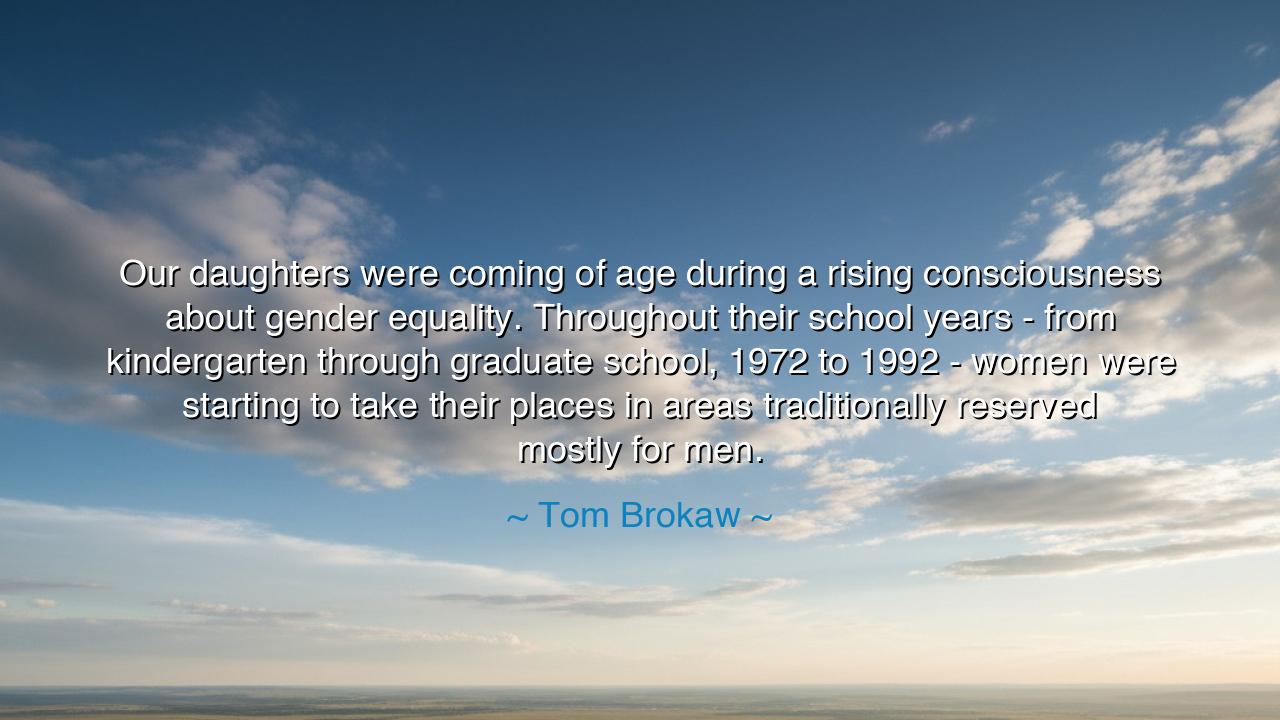
Our daughters were coming of age during a rising consciousness
Our daughters were coming of age during a rising consciousness about gender equality. Throughout their school years - from kindergarten through graduate school, 1972 to 1992 - women were starting to take their places in areas traditionally reserved mostly for men.






Hear now, O sons and daughters of progress, the words of Tom Brokaw, the chronicler of generations, who once reflected: “Our daughters were coming of age during a rising consciousness about gender equality. Throughout their school years — from kindergarten through graduate school, 1972 to 1992 — women were starting to take their places in areas traditionally reserved mostly for men.” These words, though gentle in tone, ring with the echo of a great awakening — the steady march of women into realms once guarded by custom and prejudice. Brokaw speaks not only as a father, but as a witness to history, whose eyes beheld the dawn of a new balance between the masculine and the feminine in the world’s great story.
The meaning of his words is profound. Brokaw’s daughters grew in an age of transformation — a time when the seeds sown by the feminist movements of the 1960s and 1970s began to bear fruit. The tide of gender equality was rising, not in fury, but with the steady persistence of truth reclaiming its rightful place. The world was learning — sometimes reluctantly, often painfully — that talent, intellect, and courage know no gender. His observation reminds us that this shift did not happen overnight, nor by decree, but through the daily acts of countless women who dared to step into places where their presence was once unthinkable.
In naming the years 1972 to 1992, Brokaw anchors his reflection in a sacred era of change. In 1972, the Title IX legislation was passed in the United States, declaring that no person should be excluded from educational programs on the basis of sex. This single law became a spark that ignited transformation across classrooms, boardrooms, and stadiums alike. Girls who had once been confined to the sidelines began to enter sports, sciences, and leadership roles with courage and confidence. By 1992, the world that Brokaw’s daughters inhabited was not yet equal, but it was awake — alive with possibility. The invisible walls that had stood for centuries were beginning to crack beneath the weight of a rising generation’s dreams.
Consider, my listeners, the story of Sally Ride, who in 1983 became the first American woman to travel into space. Her journey was not merely a scientific triumph; it was a testament to the shifting tides of an age. When she looked upon the Earth from the heavens, she carried with her the hopes of millions who had long been told, “This is not your place.” So too did countless other women — doctors, professors, journalists, and athletes — claim their rightful inheritance as equals in the human endeavor. Brokaw’s daughters, and the daughters of that time, grew up seeing such examples not as miracles, but as milestones — proof that the walls of inequality could indeed be broken.
And yet, Brokaw’s reflection carries the humility of remembrance. He does not speak as a man claiming victory, but as one who stands in awe of the rising consciousness that reshaped his world. For he knew that such progress was not inevitable; it was earned through the courage of those who refused to yield to silence. Each generation of women lifted the next higher, just as climbers on a great mountain lift one another toward the summit. What his daughters experienced as opportunity was built upon the struggles, tears, and triumphs of their mothers and grandmothers.
In this, there is a lesson for all who listen: progress is a gift, but it is also a responsibility. The doors that were opened for one generation must not be allowed to close for the next. To take for granted the victories of the past is to risk their undoing. The fight for equality, as Brokaw’s words remind us, is not a single moment in history, but an ever-living movement — one that must be renewed in every age, in every heart.
Therefore, O inheritors of freedom, honor those who came before you by continuing their work. Let education be your weapon, empathy your compass, and truth your cause. Teach your daughters that their voices are sacred, and teach your sons to listen to them with reverence. Let no mind be confined by gender, and let no dream be diminished by doubt. For equality is not the triumph of one over another, but the harmony of all working together toward a higher vision of humanity.
Thus spoke Tom Brokaw, not as a prophet of change, but as a witness to it. His words remind us that every generation stands upon the shoulders of those who dared to challenge the darkness of their time. And so we must carry the torch forward — not in anger, but in gratitude, not in pride, but in purpose. For when the light of equality burns in every classroom, every workplace, and every home, then truly shall we say that humanity has matured — and that both women and men walk side by side toward the fullness of their shared destiny.






AAdministratorAdministrator
Welcome, honored guests. Please leave a comment, we will respond soon